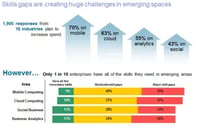A CIO magazine article based on research done with 300 CIO and IT decision makers (shown below for convenience), concludes that mobilizing apps isn't easy or fun. We know and we agree. But, it doesn't have to be that way. That's why we built Alpha Anywhere. We have created a weapon for results-oriented developers that makes the building of mobile apps substantially easier, faster and more fun, giving them and their companies or organizations a significant competitive edge!
CIOs Say Mobilizing Enterprise Apps Is Not That Easy
Employees want their go-to business apps available on their mobile devices. IT wants to deliver enterprise apps to help mobile workers become more productive. So what's keeping CIOs from bringing those critical apps to iPhones and Android phones?
By Tom Kaneshige Wed, July 31, 2013
CIO — Mobilizing apps for employees to use on their iPhones and Android devices sure sounds like a fun idea. Employees would actually be thankful for having such a cool IT department, a forward-thinking team on the cutting-edge of consumer tech helping them become more productive outside the office. But mobilizing apps isn't easy or fun at all.
That fact is the key finding of a survey of 300 CIOs and IT decision makers from research firm Vanson Bourne, conducted on behalf of enterprise application and data security company Mobile Helix. Major roadblocks have kept CIOs from mobilizing apps. Consider that the average company has 400 custom and packed applications, but only 22 percent of enterprise applications can be accessed from mobile devices. Surprisingly, 53 percent of enterprise apps are Web-based, so you'd think they'd be easy to mobilize. So what's putting the brakes on the mobile movement? The biggest barrier is mobile development costs, say 65 percent of CIOs. The cost of re-engineering enterprise apps as mobile apps is high because of the ballooning platform fragmentation of the market, particularly the many flavors of the Android operating system. Also, it's difficult to rework desktop apps traditionally viewed on a large monitor and used with a mouse and keyboard to run on a touch-based mobile device. And then there's the problem of finding talented mobile app developers to create native mobile apps. Nearly half of respondents who had developed a native app said they would have reservations about doing it again because of time, cost and complexity. Other road blocks to enterprise app mobilization: 63 percent cited security concerns and 48 percent worried about increased cost of support and maintenance. That's not to say these roadblocks are insurmountable. CIOs will eventually find ways around them, as mobility's benefits drive adoption. In the survey, 36 percent of respondents say they expect an increase in productivity if critical enterprise apps were mobilized. It may not be easy, but perhaps mobilizing apps is just a matter of time. Nine out of 10 respondents said they have either taken steps to develop applications for mobile use or are planning to do so in the near future. Tom Kaneshige covers Apple, BYOD and Consumerization of IT for CIO.com. Follow Tom on Twitter @kaneshige. Follow everything from CIO.com on Twitter @CIOonline,Facebook, Google + and LinkedIn. Email Tom at tkaneshige@cio.com




Comment